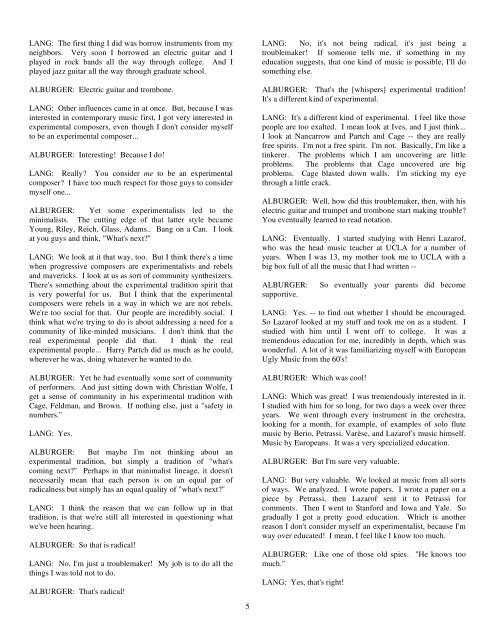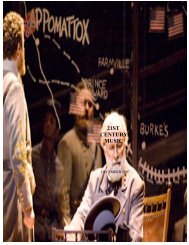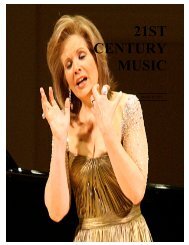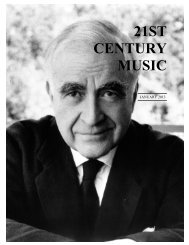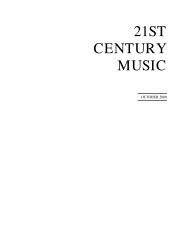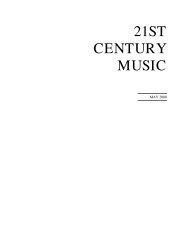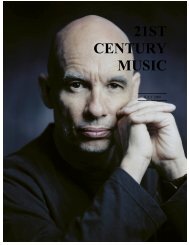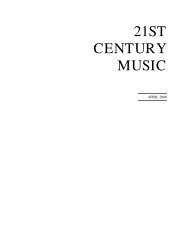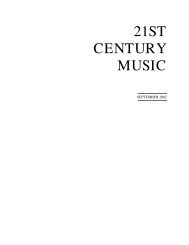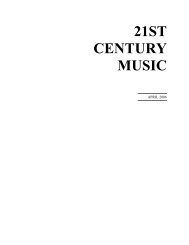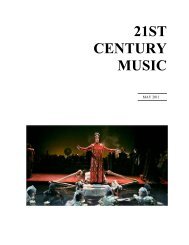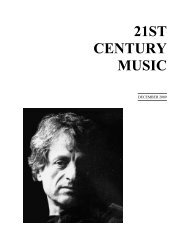Create successful ePaper yourself
Turn your PDF publications into a flip-book with our unique Google optimized e-Paper software.
LANG: The first thing I did was borrow instruments from my<br />
neighbors. Very soon I borrowed an electric guitar and I<br />
played in rock bands all the way through college. And I<br />
played jazz guitar all the way through graduate school.<br />
ALBURGER: Electric guitar and trombone.<br />
LANG: Other influences came in at once. But, because I was<br />
interested in contemporary music first, I got very interested in<br />
experimental composers, even though I don't consider myself<br />
to be an experimental composer...<br />
ALBURGER: Interesting! Because I do!<br />
LANG: Really You consider me to be an experimental<br />
composer I have too much respect for those guys to consider<br />
myself one...<br />
ALBURGER: Yet some experimentalists led to the<br />
minimalists. The cutting edge of that latter style became<br />
Young, Riley, Reich, Glass, Adams.. Bang on a Can. I look<br />
at you guys and think, "What's next"<br />
LANG: We look at it that way, too. But I think there's a time<br />
when progressive composers are experimentalists and rebels<br />
and mavericks. I look at us as sort of community synthesizers.<br />
There's something about the experimental tradition spirit that<br />
is very powerful for us. But I think that the experimental<br />
composers were rebels in a way in which we are not rebels.<br />
We're too social for that. Our people are incredibly social. I<br />
think what we're trying to do is about addressing a need for a<br />
community of like-minded musicians. I don't think that the<br />
real experimental people did that. I think the real<br />
experimental people... Harry Partch did as much as he could,<br />
wherever he was, doing whatever he wanted to do.<br />
ALBURGER: Yet he had eventually some sort of community<br />
of performers. And just sitting down with Christian Wolfe, I<br />
get a sense of community in his experimental tradition with<br />
Cage, Feldman, and Brown. If nothing else, just a "safety in<br />
numbers."<br />
LANG: Yes.<br />
ALBURGER: But maybe I'm not thinking about an<br />
experimental tradition, but simply a tradition of "what's<br />
coming next" Perhaps in that minimalist lineage, it doesn't<br />
necessarily mean that each person is on an equal par of<br />
radicalness but simply has an equal quality of "what's next"<br />
LANG: I think the reason that we can follow up in that<br />
tradition, is that we're still all interested in questioning what<br />
we've been hearing.<br />
ALBURGER: So that is radical!<br />
LANG: No, I'm just a troublemaker! My job is to do all the<br />
things I was told not to do.<br />
ALBURGER: That's radical!<br />
5<br />
LANG: No, it's not being radical, it's just being a<br />
troublemaker! If someone tells me, if something in my<br />
education suggests, that one kind of music is possible, I'll do<br />
something else.<br />
ALBURGER: That's the [whispers] experimental tradition!<br />
It's a different kind of experimental.<br />
LANG: It's a different kind of experimental. I feel like those<br />
people are too exalted. I mean look at Ives, and I just think...<br />
I look at Nancarrow and Partch and Cage -- they are really<br />
free spirits. I'm not a free spirit. I'm not. Basically, I'm like a<br />
tinkerer. The problems which I am uncovering are little<br />
problems. The problems that Cage uncovered are big<br />
problems. Cage blasted down walls. I'm sticking my eye<br />
through a little crack.<br />
ALBURGER: Well, how did this troublemaker, then, with his<br />
electric guitar and trumpet and trombone start making trouble<br />
You eventually learned to read notation.<br />
LANG: Eventually. I started studying with Henri Lazarof,<br />
who was the head music teacher at UCLA for a number of<br />
years. When I was 13, my mother took me to UCLA with a<br />
big box full of all the music that I had written --<br />
ALBURGER:<br />
supportive.<br />
So eventually your parents did become<br />
LANG: Yes. -- to find out whether I should be encouraged.<br />
So Lazarof looked at my stuff and took me on as a student. I<br />
studied with him until I went off to college. It was a<br />
tremendous education for me, incredibly in depth, which was<br />
wonderful. A lot of it was familiarizing myself with European<br />
Ugly <strong>Music</strong> from the 60's!<br />
ALBURGER: Which was cool!<br />
LANG: Which was great! I was tremendously interested in it.<br />
I studied with him for so long, for two days a week over three<br />
years. We went through every instrument in the orchestra,<br />
looking for a month, for example, of examples of solo flute<br />
music by Berio, Petrassi, Varèse, and Lazarof's music himself.<br />
<strong>Music</strong> by Europeans. It was a very specialized education.<br />
ALBURGER: But I'm sure very valuable.<br />
LANG: But very valuable. We looked at music from all sorts<br />
of ways. We analyzed. I wrote papers. I wrote a paper on a<br />
piece by Petrassi, then Lazarof sent it to Petrassi for<br />
comments. Then I went to Stanford and Iowa and Yale. So<br />
gradually I got a pretty good education. Which is another<br />
reason I don't consider myself an experimentalist, because I'm<br />
way over educated! I mean, I feel like I know too much.<br />
ALBURGER: Like one of those old spies. "He knows too<br />
much."<br />
LANG: Yes, that's right!


